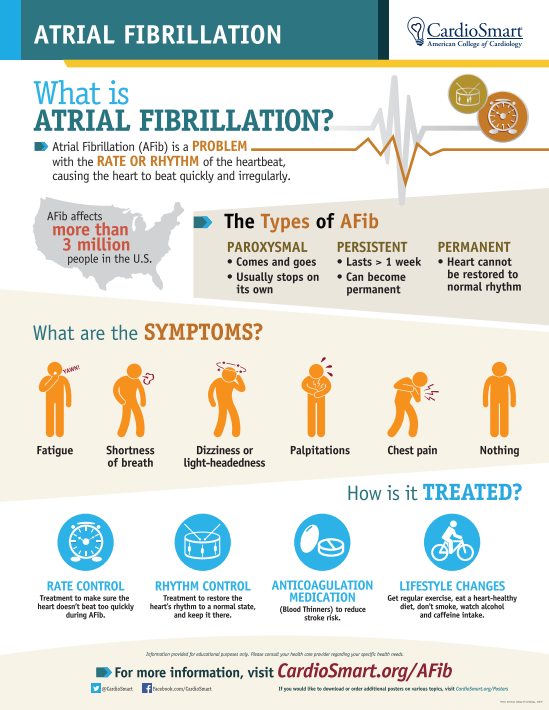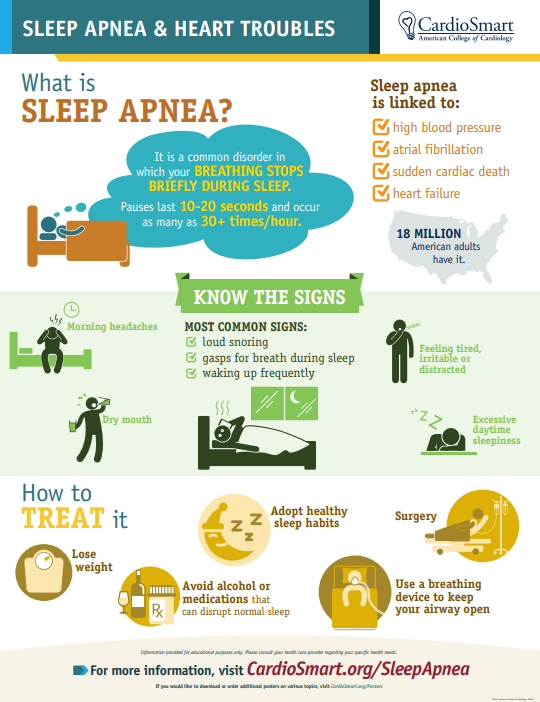(1/11) #AFibAwareness #Tweetorial: Today is #AFibAwarenessDay and we’re sharing facts about atrial fibrillation! Follow this thread to learn more & answer Qs about #AFib symptoms, treatments & more in “Treatment of Atrial Fibrillation: Is Timing Everything?”
#ACCEP #HRSOnline
#ACCEP #HRSOnline

(2/11) #AFibAwareness #Tweetorial: AFib is the most common sustained heart rhythm problem & affects 43.6 million patients across the 🌎.
#AFib can be associated with significant symptoms & an ⬆ risk of #stroke, #heartfailure, dementia & mortality. bit.ly/3eShyZl
#AFib can be associated with significant symptoms & an ⬆ risk of #stroke, #heartfailure, dementia & mortality. bit.ly/3eShyZl

Questions: Given high prevalence of #AFib, what is the optimal screening strategy for AF? When and how? What is the role for wearable technology? bit.ly/3hlcv5b 

(3/11) #AFibAwareness #Tweetorial: For many patients, #AFib can lead to symptoms that can greatly impact QoL. Symptom control is one of the main pillars of treatment (rate vs rhythm control) bit.ly/3hx5iz0
How does one choose?
How does one choose?

Questions: From the patient perspective, how does one figure out if their symptoms are due to #AFib? For physicians, what tools do you use the assess the impact of AF on your patient’s quality of life? (e.g. EHRA symptom scale, other) bit.ly/3hx5iz0 @stopafib @EhlertACE
(4/11) #AFibAwareness #Tweetorial: For some patients, even when heart rates are well-controlled, symptoms can persist.
High symptom burden, poorly controlled heart rates, HF & younger age favor rhythm control.
Does timing of treatment matter?
High symptom burden, poorly controlled heart rates, HF & younger age favor rhythm control.
Does timing of treatment matter?

(5/11) #AFibAwareness #Tweetorial: Timing of restoration of normal rhythm in #AFib patients can matter. Studies show electrical, mechanical & structural changes can occur in the ❤ after periods of AF.
Shouldn’t rhythm control result in better outcomes? bit.ly/32eP74P
Shouldn’t rhythm control result in better outcomes? bit.ly/32eP74P

(6/11) #AFibAwareness #Tweetorial: The AFFIRM study compared rhythm & rate control.
Rhythm control= cardioversion & antiarrhythmic 💊
Rate control= AV nodal blocking agents
No diff in mortality b/w the 2 strategies & ⬆ #stroke rate in rhythm control. bit.ly/2ZtlOtA
Rhythm control= cardioversion & antiarrhythmic 💊
Rate control= AV nodal blocking agents
No diff in mortality b/w the 2 strategies & ⬆ #stroke rate in rhythm control. bit.ly/2ZtlOtA

(7/11) #AFibAwareness #Tweetorial: Since 2002 #CatheterAblation has emerged as an important therapy for the treatment of AF.
Studies found ablation > anti-arrhythmic drugs for achieving sinus rhythm.
Has ablation altered the 💬 of rhythm vs rate control? bit.ly/3m3feU6
Studies found ablation > anti-arrhythmic drugs for achieving sinus rhythm.
Has ablation altered the 💬 of rhythm vs rate control? bit.ly/3m3feU6

(8/11) #AFibAwareness #Tweetorial: Obesity, #highbloodpressure, OSA & #diabetes can contribute to AF.
Treating these conditions w/ specific targets & implementing lifestyle changes of exercise & weight loss can help ⬇ AF & its adverse effects. bit.ly/32gYYqB
Treating these conditions w/ specific targets & implementing lifestyle changes of exercise & weight loss can help ⬇ AF & its adverse effects. bit.ly/32gYYqB

Questions: What are the biggest challenges for achieving patient adherence to risk factor modification goals? Do you screen every patient with #AFib for #sleepapnea? bit.ly/33kXNWN 

(9/11) #AFibAwareness #Tweetorial:
Over the past 20 yrs:
👉 Long-term anticoagulation for #stroke reduction
👉 Catheter ablation for patients w/ symptoms & HF
👉 Risk factor modification
has led to an evolution in the treatment of #AFib. bit.ly/32irlFe
Over the past 20 yrs:
👉 Long-term anticoagulation for #stroke reduction
👉 Catheter ablation for patients w/ symptoms & HF
👉 Risk factor modification
has led to an evolution in the treatment of #AFib. bit.ly/32irlFe
(10/11) #AFibAwareness #Tweetorial: The EAST-AFNET 4 study revisited the Q of rhythm vs rate control.
It found that early rhythm control w/ antiarrhythmic 💊 & ablation therapy led to ⬇ in death, #stroke & CV events when compared to rate control. bit.ly/2ZqtpZY
It found that early rhythm control w/ antiarrhythmic 💊 & ablation therapy led to ⬇ in death, #stroke & CV events when compared to rate control. bit.ly/2ZqtpZY

(11/11) #AFibAwareness #Tweetorial: The decisions involved in #AFib treatment can be complex. The best approach is patient-centered & explores the patient's preferences & goals.
An integrated, team-based approach can best address patient needs. bit.ly/3bSLQeM
An integrated, team-based approach can best address patient needs. bit.ly/3bSLQeM

• • •
Missing some Tweet in this thread? You can try to
force a refresh









